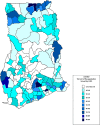Developing organizational learning for scaling-up community-based primary health care in Ghana
- PMID: 35036554
- PMCID: PMC8753302
- DOI: 10.1002/lrh2.10282
Developing organizational learning for scaling-up community-based primary health care in Ghana
Abstract
Introduction: Achieving effective community-based primary health care requires evidence for guiding strategic decisions that must be made. However, research processes often limit data collection to particular organizational levels or disseminate results to specific audiences. Decision-making that emerges can fail to account for the contrasting perspectives and needs of managers at each organizational level. The Ghana Health Service (GHS) addressed this problem with a multilevel and sequential research and action approach that has provided two decades of implementation learning for guiding community-based primary health care development.
Method: The GHS implementation research initiatives progressed from (i) a participatory pilot investigation to (ii) an experimental trial of strategies that emerged to (iii) replication research for testing scale-up, culminating in (iv) evidence-based scale-up of a national community-based primary health care program. A reform process subsequently repeated this sequence in a manner that involved stakeholders at the community, sub-district, district, and regional levels of the system. The conduct, interpretation, and dissemination of results that emerged comprised a strategy for achieving systems learning by conducting investigations in phases in conjunction with bottom-up knowledge capture, lateral exchanges for fostering peer learning at each system level, and top-down processes for communicating results as policy. Continuous accumulation of qualitative data on stakeholder reactions to operations at each organizational level was conducted in conjunction with quantitative monitoring of field operations.
Results: Implementation policies were enhanced by results associated with each phase. A quasi-experiment for testing the reform process showed that scale-up of community-based primary health care was accelerated, leading to improvements in childhood survival and reduced fertility.
Conclusion: Challenges to system learning were overcome despite severe resource constraints. The integration of knowledge generation with ongoing management processes institutionalized learning for achieving evidence-driven program action.
Keywords: Community‐based Health Planning and Services; Ghana; community‐based primary health care; health systems strengthening; learning health system; research utilization; scaling‐up.
© 2021 The Authors. Learning Health Systems published by Wiley Periodicals LLC on behalf of University of Michigan.
Conflict of interest statement
The authors have no conflicts of interest to declare.
Figures





References
-
- World Health Organization . Alma Ata Declaration. Geneva, Switzerland; 1978.
-
- Ghana Health Service . The Community‐Based Health Planning and Services (CHPS) Initiative. Accra, Ghana; 1999.
-
- Ghana Health Service . National Community‐Based Health Planning and Services Policy: Accelerating Attainment of Universal Health Coverage and Bridging the Access Equity Gap. Accra, Ghana; 2016.
-
- Phillips JF, Binka FN, Awoonor‐Williams JK, Bawah AA. Four decades of community‐based primary health care development in Ghana. In: Bisha D, Schleiff M, eds. Health for All – Success Stories from Countries that Transformed People's Health: Essays to Recognize the 40th Anniversary of the Alma Ata Conference. Baltimore, MD: Johns Hopkins University Press; 2020:225‐257. https://www.google.com/books/edition/Achieving_Health_for_All/Ofn4DwAAQB....
LinkOut - more resources
Full Text Sources

